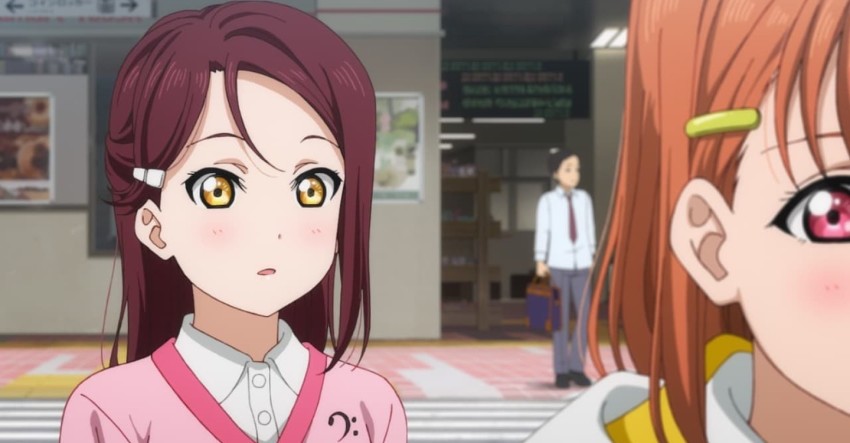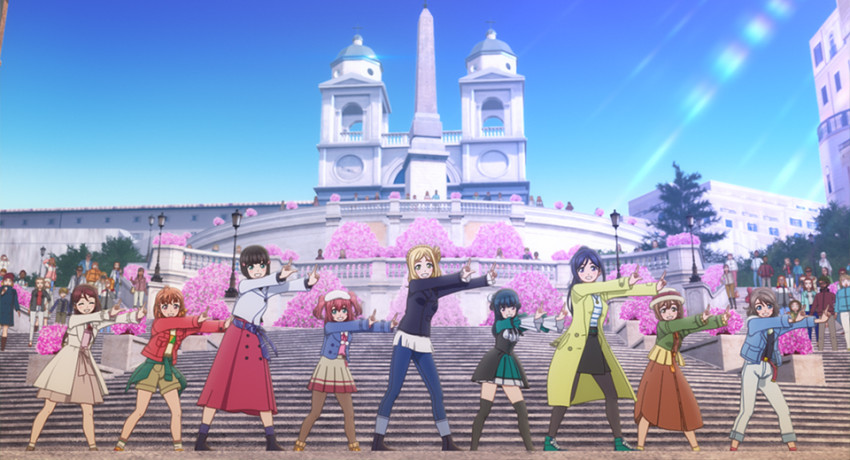Love Live Sunshine: Over the Rainbow
October 23, 2020 · 0 comments
By Shelley Pallis.

The seaside town of Numazu has a “special” status in Japan. That’s supposed to mean that it has a quirkily autonomous mayoral council, but the tourist trade is keen to jump on the idea, and witters incessantly about how you can see Mount Fuji from the harbour, and how nobody makes noppo bread like the Numazu people. There’s even a “Romance” train from Shinjuku, that will whisk you, and someone you are trying to impress, away to the seaside in just two hours, where you can apparently “see all the nature.”
So, in other words, Numazu is very much the same as a hundred other towns in Japan, but for one distinguishing factor. It is the home of the Uranohoshi girls’ school, proud hosts of the Aqours pop phenomenon, an all-girl singing sensation that hit it big at the Love Live competition. And you can be sure that the local tourist board won’t be shutting up about that any time soon, even if the Uranohoshi girls’ school is a made-up place populated by cartoon characters. Because everywhere in Japan now needs to be a “holy land” (seichi) for some media franchise or other, something that the cast of Love Live Sunshine: Over the Rainbow are so keen to stress that they even nip back in a post-credits sequence to say “holy land” a few times.
Love Live is a creation of “Hajime Yadate” – the house pseudonym slapped by Sunrise on its franchises to keep them company owned. And like certain other Sunrise creations that shall not be named, but which involve giant robots that don’t sing a whole lot, Love Live needs to reboot every year or so by coming up with a storyline that’s almost exactly the same as the one before, but with different hairstyles and merchandise.
Aqours were inspired by a previous girl-group in an earlier Love Live series, which, like them turned to a talent show in a vaguely defined plan to keep their school from closing – as in “If only some sixth-formers win Britain’s Got Talent, the evil corporation won’t send in the bulldozers!” Unlikely though this plan may seem, it has already worked once in the Love Live universe, so it should come as no surprise that someone is trying it again.
But three of the Aqours girls have graduated now, so they are fated to go to another school (hopefully one that won’t be slated for demolition), and as the movie Over the Rainbow begins, they are realising that they are ill-prepared for life outside school. After giving their all to save the school, they’ve lost their free rehearsal space – sadly for cynics like me, the perennially happy show doesn’t feature some jobsworth at their former alma mater telling them to clear off, which might have been a lesson in institutional loyalty.
 In much the same fashion as Glee, the girls are prone to launch into song-and-dance numbers that spill out of the theatre and into the world outside, clogging the shopping mall and train station with dancing soubrettes in pastel skirts. The locals occasionally join in – as with a quartet of clapping fisherman down by the harbour – and much more entertainingly, occasionally don’t, looking on with barely concealed revulsion as four schoolgirls skip past singing about true love.
In much the same fashion as Glee, the girls are prone to launch into song-and-dance numbers that spill out of the theatre and into the world outside, clogging the shopping mall and train station with dancing soubrettes in pastel skirts. The locals occasionally join in – as with a quartet of clapping fisherman down by the harbour – and much more entertainingly, occasionally don’t, looking on with barely concealed revulsion as four schoolgirls skip past singing about true love.
But there is drama. So much drama. The show is taken up with interminable longueurs of being a 15-year-old girl in small town Japan, all cake shops and wild speculation about boys. Notably, it is so wrapped up in its mid-teen worldview that actual adults are often little more than background decoration – you’d be forgiven for thinking there had been some sort of apocalypse that had rendered all non-teens mute. But this indeed the sort of word where a simple age difference of a few months can serve to split up an entire group between middle- and high-schools, and where the departure of the three oldest members of Aqours leaves the other six wondering if there is any point in continuing.
You-chan’s cousin, the tomboy Tsuki-chan, is transferring into the neighbourhood (because we needed yet another cast member, in an anime show that makes So Solid Crew look under-staffed), which is cause for much revelation about what You-chan thinks of her friends, as told to someone else. But Tsuki also has chilling and rather vaguely explained news, that the parents at the school are worried that the Uranohoshi transfers are going to ruin the other school clubs – which means that the Uranohoshi girls will have to demonstrate (again) national competition-winning skills in order to win over the parents. Frustratingly, we don’t get to see their first performance for their new school, in which they apparently bomb because someone’s hair clip falls off. Nor their second rehearsal on a beach, which visiting colleagues tell them is rubbish. In fact, after the opening musical number, Love Live Sunshine is oddly devoid of songs for the next 30 minutes.
It’s Riko Sakurauchi who gets to explain why idol clubs are so misunderstood. Their performances, she points out, are always peppy and cheerful, their smiles are pasted on, their job is to impart the absolute pinnacle of frivolity. But the audience doesn’t get to see the backstage tribulations, the rehearsals, the mis-steps; they only get to see the polished final result. Nobody wants to watch dancers who clearly aren’t enjoying themselves, or singers who are struggling to hit the right notes – such a sight would completely ruin the performance dynamics, and leave the audience feeling uneasy.
Well, firstly, I’d point out that half of modern television seems to be aimed at showing us the backstage tribulations, rehearsals and mis-steps, not to mention sob-stories about ailing family members, sick pets and schools facing closure. But point taken, particularly after one girl, Leah, is revealed to be out of the singing game after failing to round up any suitable candidates for a new group. Love Live isn’t just a series about the need for self-improvement – it’s about the vital, almost impossible synergy that hones eleven (or nine, or three…) different girls into one note-perfect unit.
Who are these Evil Parents? Tsuki has already said that all the schoolchildren are on the new arrivals’ side, and so are the teachers. It’s difficult to think of a jeopardy so ill-defined as “something that someone said to my friend’s mum”, but this is pretty much where we apparently are. Love Live Sunshine doesn’t really have any bad guys, since, like many a super-hero show over the last few years, the roster of protagonists is so over-populated that there isn’t really any space for enemies. Toshio Okada, theorist of otakuology, traces this imbalance of casting back to some toy company surveys in the 1990s, which observed that far more dolls were sold of Ultraman than of the monsters he fought.
 Mari Ohara, long-term viewers may remember, was the central singer of Aqours, but in this film, it is her millionaire mother, with a gaijin accent bordering on the racist, whose shows up in a pink helicopter to enlist their help in finding her daughter. She does so by showering them with chocolate money: “A performance to show I will pay for your travel desu.” The elder Ohara is the closest thing the film has to a deceitful adult, but even then, she’s bankrolling their travel and open to being persuaded of the evil of her ways, so even she’s kind of with the good guys.
Mari Ohara, long-term viewers may remember, was the central singer of Aqours, but in this film, it is her millionaire mother, with a gaijin accent bordering on the racist, whose shows up in a pink helicopter to enlist their help in finding her daughter. She does so by showering them with chocolate money: “A performance to show I will pay for your travel desu.” The elder Ohara is the closest thing the film has to a deceitful adult, but even then, she’s bankrolling their travel and open to being persuaded of the evil of her ways, so even she’s kind of with the good guys.
In other words, deprived of the three elder members who apparently did most of the heavy-lifting, Aqours is flapping around like a twelve-legged headless chicken. Urged that they need to think for themselves, they instead go looking for the three departed members, in order to ask them what they’re doing wrong. I suppose, maybe in Japan, that counts as thinking for yourself? Fortunately, Mari’s mum will pay for them to look.
“Very very thank you desu,” she says, and the girls are off to Italy!
K-On the Movie didn’t take this long to get its cast to That Fancy London, and I don’t remember it taking this long to get everyone to New York in the first Love Live movie, but anyway, here we are in Venice (and, briefly, Florence and Rome), as if teleported there by magic, while the newcomer Tsuki-chan turns out to have grown up in Italy, and knows her way around. Miraculously, none of the girls get their bottom pinched or are chatted up by any gelato sellers (my experience may have varied). Instead they are dragged off on a treasure hunt of sorts, bouncing from convenient clue to convenient clue, while their three erstwhile classmates consistently give them the slip, pleading that they don’t have time to explain.
The animated component of Love Live seems is difficult to take seriously. Surely, it’s the live-action coordination of song and dance that makes musicals so watchable? The fact that a drawn character can hold a perfect pose, or sync in time with another drawn character, seems a little like an easy grade. But some of the sequences are plainly motion-captured, which means we’re watching a real dancer, imitating an animated character, and the artifice is in the integration of that image into 2D and 3D onscreen elements.
And yet the film plainly struck a chord with the fans – 93,000 CDs of the soundtrack were snapped up in Japan last year. Clearly it was also a hit with the businesses of the sleepy town of Numazu, since every place you see on screen, from Doll House Kimura to Japanese Fine Sweets Grandma is a real establishment, eagerly awaiting a rush of Love Live tourists.
Not so much the people of Venice, though. As the credits roll in Japanese, a warning note has been appended to the list of sponsors, presumably at the instigation of some fretful Italian tourist officer.
“In the real Venice,” it decrees, “stopping and consuming food items is prohibited outside of public eating areas and designated rest spaces.” Someone on the location-hunting team, I suspect, got scolded for scoffing an ice cream inside a palazzo.
Leave a Reply